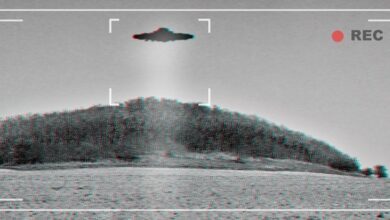Tennessee State Legislature Passes Bill Outlawing Chemtrails

A new piece of legislation introduced to the Tennessee state senate by Republican Steve Southerland will effectively ban chemtrails in the skies over the Volunteer State.
Due to an amendment added in February, the bill—which passed in the house earlier this month with a vote of 70-22-1 and is currently headed to Governor Bill Lee for approval—will prohibit “the intentional injection, release, or dispersion, by any means, of chemicals, chemical compounds, substances, or apparatus within the borders of this state into the atmosphere with the express purpose of affecting temperature, weather, or the intensity of the sunlight.”
While the bill does not refer to chemtrails by name, its specific mention of chemicals “affecting temperature, weather, or the intensity of the sunlight” speaks directly to conspiracy theories regarding chemical agents deposited in the sky for nefarious purposes.
Conspiracy lore has it that chemtrails—reportedly distinct from normal contrails left by airplanes due to their color, crisscrossing pattern, and the length of time they linger—are used by government agencies for weather modification, solar radiation management, population control, various psyops, biological and chemical warfare, and the testing of biological and chemical agents on humans. Believers in chemtrails posit that they are responsible for causing a variety of respiratory illnesses and other health problems.
The new bill has inspired Pennsylvania state senator Doug Mastriano to declare that he will introduce similar legislation in his own state, as well as motivating scientists to speak out about the purported chemtrail conspiracy.
“There’s no such thing as chemtrails,” Alan Robock, a climate science professor at Rutgers university, told The Guardian. “If you look at the sky, sometimes you see contrails from airplanes—condensation trails—and they’re just made out of water. It’s the same thing that happens in the winter when you breathe out and you see a little cloud in front of your mouth. It’s a mixture of warm, humid air with cold, dry air.”
“There’s no evidence that anybody is pumping chemicals into airplanes. If this was a huge [government] conspiracy to do those things, do you think nobody would sort of, tell on them?” he added.
Despite attempts to debunk chemtrails, a YouGov/Statista survey from 2019 found that 8% of Americans still “strongly believe” that “the government is using chemicals to control the population [through chemtrails].” Beyond that, another 11% of people asked said that they “somewhat believe” in chemtrails.
Both the Tennessee and Pennsylvania bills leave out specific mentions of chemtrails, instead focusing on “solar geoengineering”—this refers to proposed approaches to combat climate change by reflecting solar radiation back into space—although some suspect that this is merely an attempt by legislators to avoid being labeled conspiracy theorists; a curious move given the connections such theories have asserted to exist between solar geoengineering and chemtrails.
Connections addressed directly in a recent article entitled “Chemtrails Conspiracy Theory,” published by David Keith’s Research Group for Harvard University, which stated, “Because of the apparent similarities between the proposed implementation methods for [solar geoengineering] (such as injecting reflective particles into the stratosphere), and the alleged methods for producing chemtrails, some people have linked the notion of chemtrails to the study of [solar geoengineering].”
However, the researchers said, “We are confident that there is no currently active program to actually test or implement [solar geoengineering],” and furthermore, “We have not seen any credible evidence that chemtrails exist. If we did see any evidence that governments were endangering their own citizens in the manner alleged in the chemtrails conspiracy, we would be eager to expose and stop any such activities.”




